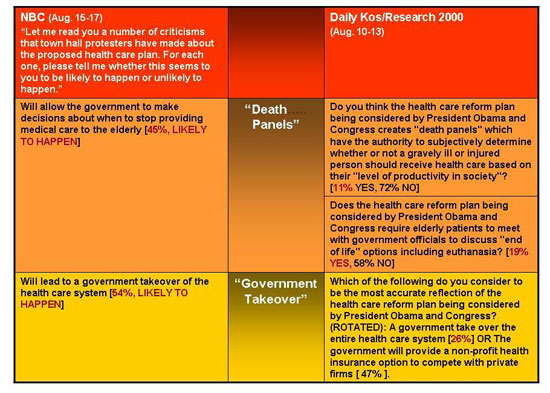A common theme in recent health care polling — presumably stemming from the heated rhetoric at town-hall meetings and elsewhere — is the degree to which various claims have sunk in with the American people. These claims either refer to policies that are not in any of the bills working their way through Congress or appear to represent gross exaggerations of provisions that are in bills.
Three polls probing for the acceptance of misconceptions have been released in the last two days, from NBC News, Daily Kos, and Public Policy Polling [PPP]. Daily Kos is a well-known left-leaning blog, but it uses the established, independent pollster Research 2000 to conduct its surveys.
NBC and Kos asked about a couple of the same areas, as shown in the chart below (which you can click to enlarge). Interestingly, the two polls appear to differ substantially in how much acceptance of misconceptions exists in the U.S. public (percentages indicative of misconceptions are shown in maroon). Whereas the NBC poll shows roughly half of the public endorsing misconceptions, Kos shows only 10-25% acceptance of them.
One possible reason for the NBC poll’s higher endorsement level has been suggested by Brendan Nyhan:
The problem is that NBC asked respondents if various results were “likely to happen” under the proposed health care plan, a vague phrase that allows for implausible but increasingly popular fallback position that the provisions in question are not in the plan but will somehow result from it in practice.
A focus of the Kos poll was comparing the responses of self-identified Democrats, Republicans, and Independents. For example, on the question of whether the proposed legislation “creates ‘death panels’ which have the authority to subjectively determine whether or not a gravely ill or injured person should receive health care based on their ‘level of productivity in society’,” high percentages of Democrats (88%) and Independents (76%) correctly say “no,” whereas only 43% of Republicans do so.
Two polls looked at the public’s understanding that Medicare is a government program. According to PPP:
One poll question indicative of how difficult it is to gain public understanding on a complicated issue asked if respondents thought the government should ‘stay out of Medicare,’ something inherently impossible. 39% said yes.
Kos simply asked: “Is Medicare a government program or not?” Respondents of all three partisan groups overwhelmingly gave the correct response of “yes,” but the percentage of Republicans who did so (76%) was somewhat lower than the corresponding figures for Democrats (89%) and Independents (83%).
- Bulenox: Get 45% to 91% OFF ... Use Discount Code: UNO
- Risk Our Money Not Yours | Get 50% to 90% OFF ... Use Discount Code: MMBVBKSM
Disclaimer: This page contains affiliate links. If you choose to make a purchase after clicking a link, we may receive a commission at no additional cost to you. Thank you for your support!



Unfortunately, we’re a nation of idiots…